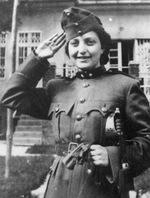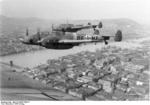
Hungary
| Full Name | 21 Kingdom of Hungary | |
| Alliance | Axis - Minor Member Nation or Possession | |
| Entry into WW2 | 27 Jun 1941 | |
| Population in 1939 | 9,129,000 | |
| Military Deaths in WW2 | 300,000 | |
| Civilian Deaths in WW2 | 680,000 | |
| - Civ Deaths from Holocaust | 400,000 |
Contributor: C. Peter Chen
ww2dbaseThe post-WW1 Hungary, with the proud Austro-Hungarian Empire memory still fresh in mind, created an environment favorable for right-wing political parties not unlike that of Germany in the same period. Miklós Horthy, the former Commander-in-Chief of the Austro-Hungarian Imperial Navy who had ruled the nation as the regent since 1920, appointed German-leaning Gyula Gömbös as the Prime Minister in 1932. As it would turn out, the rise of the Nazi Party in Germany dramatically improved German industrial output and financial health, which also greatly benefited Hungary, which traded with Germany heavily. By 1935, Gömbös had gained strong influence in parliament, but died in Oct 1936 before being able to achieve his goal of forming a single-party government and to repeal the Treaty of Trianon. His successors Kálmán Darányi achieved the latter goal with the support of Adolf Hitler, who by that time had renounced the similar restrictions imposed on Germany at the end of WW1; it was also during Darányi's leadership that the first anti-Semitic policies were passed: The First Jewish Law limited the number of Jews in certain professions. Darányi's successor Béla Imrédy briefly attempted to lean Hungary toward Britain, but he retained a similar right-wing stance; the Second Jewish Law passed under his leadership further restricted the liberties of Jews in Hungary. The Imrédy years also saw the First Vienna Award, in which Hungary gained parts of Southern Slovakia and Carpathian Ruthenia, with a total population of 869,299, with German support; Hitler proposed further cecessions of Czechoslovakian territory to Hungary, but Horthy noted that he would only accept territory populated with Hungarian majority. Prime Minister Pál Teleki entered office in Feb 1939. In the following month, Germany succeeded in dismembering Czechoslovakia, and in the ensuing chaos the Carpatho-Ukraine region declared independence; Hungary rejected such declaration and invaded, and occupied the region, on 14 Mar 1939. Shortly after, the newly formed Slovakia and Hungary entered into a brief armed engagement, Little War, that resulted in Hungary gaining a small piece of territory. In Sep 1940, Hungary gained from Romania the northern half of Transylvania, with a population of 2,578,100, per the Second Vienna Award. By this time, Hungary had largely reversed the losses that Hungary had suffered as the result of the Treaty of Trianon.
ww2dbaseHungary was pressured into joining the Tripartite Pact in Nov 1940; a month later, the Treaty of Eternal Friendship was signed with Yugoslavia, which was also being pressured by Germany to join the Axis at the same time. Although the European War had raged on for more than a year now, aside from the limited fighting against its immediate neighbors during the border disputes, Hungary had not yet seen combat. It would soon change as Germany pressured Hungary into invading Yugoslavia, which resisted German pressures to join the Axis. Teleki, frustrated in his inability to resist both external pressure from Germany and lack of support from within his own country, committed suicide on 3 Apr 1941. Miklós Horthy and Teleki's successor Prime Minister László Bárdossy sent Hungarian Third Army into action in Yugoslavia, capturing Vojvodina during the fighting and annexing sections of Baranja, Backa, Medimurje, and Prekmurje at the end of the fighting. During the fighting in Yugoslavia, Hungarian troops would execute 3,000 Serbian and Jewish hostages near Novi Sad. Bárdossy later would, in Aug 1941, pass the Third Jewish Law which prohibited marriage and sexual intercourse between Jewish and non-Jewish Hungarians. At the start of the German invasion of the Soviet Union, some elements of the Hungarian leadership wished to join in the fighting, but this did not take place immediately; the 26 Jun 1941 Soviet air strike on Kassa (now Kosice, Slovakia), however, provided the ammunition for Hungarian participation. Hungarian Carpathian Group, as a part of German 17th Army, attacked Soviet 12th Army as early as 1 Jul 1941, four days after the Hungarian declaration of war on Soviet Union. Hungarian troops saw action in southeastern Europe, including the Battle of Stalingrad, where they suffered high casualties. Bárdossy's reign would turn out to last only one year, after which Miklós Kállay was made the prime minister, who Horthy viewed as more independent from German influence. In the subsequent years, Soviet forces slowly turned the tide, and by 1944 Hungary faced the possibility of being invaded by the Soviets, and thus Kállay engaged in secret negotiations with the Western Allies. This was discovered by the Germans, leading to the German occupation of Hungary. Pro-German Prime Minister Döme Sztójay was installed in Mar 1944. While the Hungarian Jews had been oppressed prior to the German occupation, Hungary refused to deport them to German-operated concentration camps outside Hungarian borders. Things changed after the arrival of the Germans. 437,402 Hungarian Jews were deported, and most of whom were killed. The Nazi Adolf Eichmann gained his infamy as the bureaucrat who conducted the deportations. In Aug 1944, Horthy replaced Sztójay with General Géza Lakatos, who halted the deportations. In Sep 1944, Soviet and Romanian forces crossed the border into Hungary, and Horthy announced in the following month that Hungary had signed an armistice with the Soviet Union, although Hungarian troops continued to fight against the invaders; in response, the Germans kidnapped Horthy's son and forced him to renege on the armistice. Additionally, Horthy was forced to name the Fascist Ferenc Szálasi, who was to be a German puppet, to the position of prime minister. Although the German-Hungarian forces were still formidable, they were repeatedly pushed back by the Soviets. The capital Budapest was encircled by the end of the year, and it would fall in Feb 1945. By Apr 1945, all of Hungary would fall under Soviet control. Between 100,000 and 170,000 ethnic Germans were deported during these final days of war to be forced laborers in the Soviet Union; thousands of them would not survive the ordeal.
ww2dbaseAfter the European War, Hungary lost Subcarpathia to Ukraine of the Soviet Union, and its borders generally returned to those of 1 Jan 1938. 202,000 ethnic Germans who survived the Soviet conscription for forced laborers in 1945 were forcibly deported to Germany between 1946 and 1948. The kingdom (which had no king since the end of WW1) was abolished in 1946, and a short-lived republic lasted until 1949. In 1949, the People's Republic of Hungary was declared, which would remain in power until the end of the Cold War.
ww2dbaseSource: Wikipedia
Last Major Update: Jul 2014
| People | ||
| Bárdossy, László | Kállay, Miklós | Szálasi, Ferenc |
| Horthy, Miklós | Szenes, Hannah | Teleki, Pál |
| Jány, Gusztáv | Sztójay, Döme | |
| Events Taken Place in Hungary | ||
| The Slovak-Hungarian War | 23 Mar 1939 - 31 Mar 1939 | |
| Operation Frantic | 2 Jun 1944 - 22 Sep 1944 | |
| Budapest Strategic Offensive Operation | 29 Oct 1944 - 13 Feb 1945 | |
| Weapons | ||
| Danuvia 39M Submachine Gun | ||
Photographs
 |  |  |  |
Hungary in World War II Interactive Map
Did you enjoy this article or find this article helpful? If so, please consider supporting us on Patreon. Even $1 per month will go a long way! Thank you. Share this article with your friends: Stay updated with WW2DB: |
Visitor Submitted Comments
2 Apr 2020 12:49:56 AM
My father, living in North Tranylvania, was called up by Hungary in March 1944 and fought in France. Where can I find details?
7 Aug 2022 02:05:28 AM
Time served army
9 Aug 2022 02:46:18 AM
I would like to find the military history of my grandfather, Megyeri Janos born in 1901. I think in western Hungary, but lived in Kisfalud. He was captured on Eastern Front, but survived. Thank you.
20 May 2023 09:47:07 PM
I was trying to find any info about Hungarian troops taking part in invasion of USSR. all data seems to be removed from Wikipedia and other sources. it is impossible now to find the number of troops which took part in invading USSR, and which territories Hungarian troops invaded. the hungarian army was 1 000 000, it went to USSR and all what was done by these troops there was wipe off, massive amount of nazists atrocities, well documented by soviets. it all looks now like Hungarians suffered out of hand of Russians being angels themselves. Young hungarians were made HATING Russians, in spite their nation took part in openly genocidal war with aim of mass extermination of soviet nations. Please restore the balance and add the figures. these lies caused current conflict in Ukraine and a recovery of plans to reprogram of locals in Western part of historical area populated by Russians - ban to use Russian language, demolition of historical monuments, withdrawing of rights to vote (ethnically based non-citizen status for Russians in Baltic states) and mass bombing of Russian speaking parts of Ukraine since 2014, which too are wiped off internet.
All visitor submitted comments are opinions of those making the submissions and do not reflect views of WW2DB.
- » WW2DB's 20th Anniversary (29 Dec 2024)
- » Wreck of USS Edsall Found (14 Nov 2024)
- » Autumn 2024 Fundraiser (7 Nov 2024)
- » Nobel Peace Prize for the Atomic Bomb Survivors Organization (11 Oct 2024)
- » See all news
- » 1,150 biographies
- » 337 events
- » 44,024 timeline entries
- » 1,242 ships
- » 350 aircraft models
- » 207 vehicle models
- » 375 weapon models
- » 123 historical documents
- » 260 facilities
- » 470 book reviews
- » 28,595 photos
- » 432 maps
Winston Churchill, on the RAF
Please consider supporting us on Patreon. Even $1 a month will go a long way. Thank you!
Or, please support us by purchasing some WW2DB merchandise at TeeSpring, Thank you!
22 Dec 2019 07:00:56 AM
Where could I find if my Hungarian Grandfather took part in WW2 or any internet sites that I could search? I’m not having much luck so far.
Thank you.